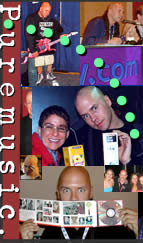 |
 |
 |
|
 |
A Conversation with Derek Sivers (continued)
PM: As a relentless workaholic, programmer, designer, thinker, do you find time to read?
DS: Oh yeah. More than almost anybody I know. I read a lot of business and marketing books because, although none of them are about music, there are so many lessons in there that you could apply to music that most people never would think of. You know what I mean? It's tough for a lot of music-minded people to read a book that has nothing to do with music, and understand that it all applies.
It was a lesson I learned at Berklee College of Music. I took a music business class there, where the teacher made us read this book called Positioning. It was just a straight-up book about analyzing the marketing of detergent brands and stuff like that. But he said, "Just trust me. Every sentence, every paragraph, apply it as it relates to music. You have to use your own brain to translate. They are not going to talk about music for you. You have to read it and think about it as if it were talking about music, and understand that it applies."
PM: In musical terms, "transpose it."
DS: [laughs] Exactly. This book, Positioning, talked about NyQuil--how the people who made NyQuil felt that they had a great cold medicine on their hands. But the problem was that the shelf was filled with thirty-eight cold medicines already. The world wasn't saying, "Gosh, if we only had a thirty-ninth cold medicine." What they did was, they very cleverly realized that nobody was specifically targeting the "nighttime helping you sleep" angle.
PM: Wow.
DS: Imagine a pie chart somewhat evenly chopped into thirty-eight little sections, right? And you're wondering where you fit into that. Well, what NyQuil did, they came along and said, "Yeah, well, those other thirty-eight guys, their products are all for the day. If it's nighttime, you need this." All of a sudden, those thirty-eight were pushed over into one half of the pie, and NyQuil got to own the entire other half of the pie.
PM: Unbelievable.
DS: I think about that a lot. When I read that in 1990, I was starting up a recording studio. I thought it totally applied. This wasn't what I ended up doing, but if it were true, I would have said, "Go to all those other studios in town for everything else, but when it comes to drums, this is the place to go. We are the drum studio." You know what I mean?
PM: Right.
DS: I think it applies to artists, too. You can kind of push the entire other musical spectrum off to one side and own your whole niche, if you're the only person who's defined this as a niche, like NyQuil did with nighttime.
PM: "Understand your angle, and if you don't have one, go get one."
DS: Exactly. From what I understand, NyQuil didn't used to have the kind of alcohol-slash-sedative in there--it was just a good cold medicine. And they put that in there in order to grab that chunk of the market with their nighttime angle.
PM: Wow.
DS: At least that's the way it was explained in the book. So, yes, I'm reading constantly. God, I'm talking a lot...
PM: But it's fascinating.
DS: Okay, if you say so. So check this out: I speak at colleges a lot, and I tell the students this, that so many people have said that I'm very lucky in what I've done, or gosh, I must be a really smart business-minded guy. But all it is is that I've read lots and lots and lots of books on the subject of business. And it starts to sink in after while, so that now I make these decisions pretty intuitively. I'm not having to go back and remember everything I've ever learned--certain decisions feel right.
And I think it's because I've spent so many years ingesting so many books, that when somebody asks, "Quick, should we start a radio station or not," then just intuitively I'm saying, "It's tempting, but I really feel in my gut that everybody needs to specialize at what they're best in and focus on that." The truth is, that probably came from a couple of chapters in a couple of books I've read over the past eight years. But when you do that enough, it just kind of becomes intuition. Everything you've ever learned, it sits in your gut somewhere and helps you make decisions.
PM: I hear you. Are you a kill-your-TV guy, or do you like Deadwood, Six Feet Under and The Sopranos?
DS: [laughs] Wait, ask that question one more time? Am I a kill-your-TV guy or what?
PM: Or do you like Deadwood, Six Feet Under and The Sopranos?
DS: [laughs] You're very accurate with both. I don't own a TV, but I like The Sopranos and the occasional South Park so much that I'll go find them and download them to watch them on my laptop when I really need a fix.
PM: [laughs] But not Deadwood or Six Feet Under?
DS: Actually, a girlfriend and I rented the whole season of Six Feet Under. And you know what--that's also how I got into The Sopranos. People just kept talking about it. Years went by. Finally I was at the video store one day, and I rented the first two seasons and got sucked in.
PM: Oh, yeah, it's totally addictive.
DS: Yeah, same thing with Six Feet Under. Yeah, see, to me it's all about the time schedule.
PM: Appointment TV doesn't make it.
DS: Yeah. You can't tell me to be sitting there every Thursday night at 8:00, or whatever.
PM: Right.
DS: But a few of those things have turned into some brilliant programs.
PM: Yeah. I mean, good art is good art--even if it happens to be on TV.
DS: Yep.
PM: So the only art bug I'll put in your ear about TV is Deadwood, my man.
DS: Okay, thanks. continue